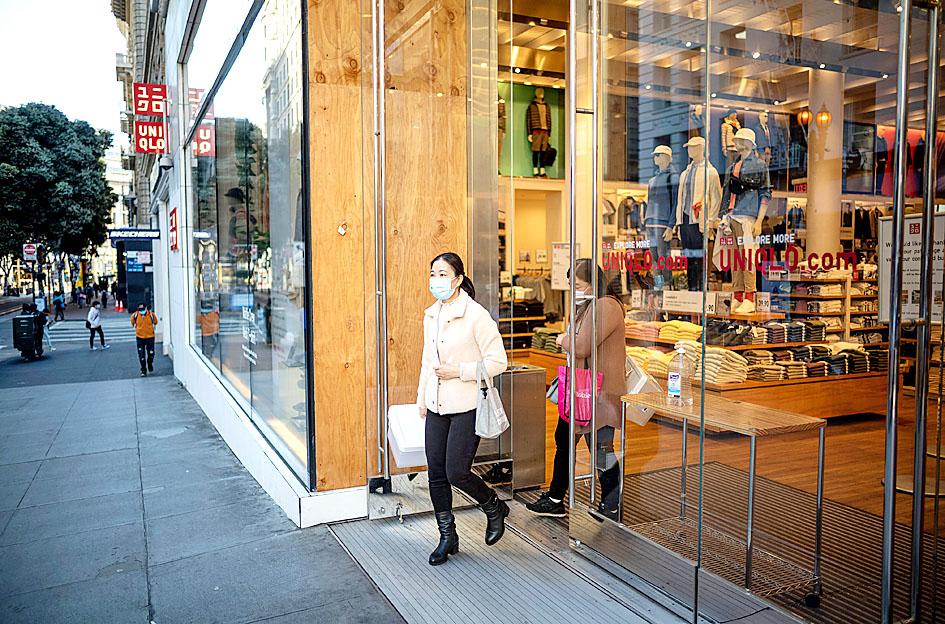US Customs and Border Protection blocked a shipment of Fast Retailing Co’s Uniqlo shirts in January for breaching an order prohibiting imports of items suspected to be produced by forced labor from China’s state-owned Xinjiang Production and Construction Corps (新疆生產建設兵團).
The blockage of Uniqlo’s cotton men’s shirts, which happened at the Port of Los Angeles, was revealed in a document dated Monday last week in which the US agency denied an appeal by Uniqlo to release the shirts.
Uniqlo is the main brand of Asia’s largest apparel retailer, Fast Retailing, and founded by Japan’s richest man, Tadashi Yanai.

Photo: Bloomberg
The US customs document said that Uniqlo had argued and provided proof that the raw cotton used to produce the shirts did not originate from Xinjiang Production and Construction Corps.
However, Uniqlo failed to provide enough information to establish the items were not produced in part by forced labor in China’s Xinjiang region, the customs agency said.
China denies any forced labor, calling it the “biggest lie of the century,” and says its policies are lifting the region out of poverty, boosting the economy and countering extremism.
Chinese Ministry of Foreign Affairs spokesman Zhao Lijian (趙立堅) yesterday reiterated that forced labor is not used in Xinjiang and accused the US of “bullying.”
“Relevant businesses should stand up and oppose the unjustified US behavior,” he said in a regular news briefing.
Uniqlo has not been a key target of boycotts in China compared with rivals such as Hennes & Mauritz AB. Yanai, who is also Fast Retailing’s chief executive officer, has repeatedly declined to comment on Xinjiang, saying the company does not involve itself in political issues.
As of last month, there were 47 Uniqlo stores in the US. Fast Retailing has about 809 Uniqlo stores in mainland China, which make up about one-fifth of revenue for the company.

CAUTIOUS RECOVERY: While the manufacturing sector returned to growth amid the US-China trade truce, firms remain wary as uncertainty clouds the outlook, the CIER said The local manufacturing sector returned to expansion last month, as the official purchasing managers’ index (PMI) rose 2.1 points to 51.0, driven by a temporary easing in US-China trade tensions, the Chung-Hua Institution for Economic Research (CIER, 中華經濟研究院) said yesterday. The PMI gauges the health of the manufacturing industry, with readings above 50 indicating expansion and those below 50 signaling contraction. “Firms are not as pessimistic as they were in April, but they remain far from optimistic,” CIER president Lien Hsien-ming (連賢明) said at a news conference. The full impact of US tariff decisions is unlikely to become clear until later this month

With an approval rating of just two percent, Peruvian President Dina Boluarte might be the world’s most unpopular leader, according to pollsters. Protests greeted her rise to power 29 months ago, and have marked her entire term — joined by assorted scandals, investigations, controversies and a surge in gang violence. The 63-year-old is the target of a dozen probes, including for her alleged failure to declare gifts of luxury jewels and watches, a scandal inevitably dubbed “Rolexgate.” She is also under the microscope for a two-week undeclared absence for nose surgery — which she insists was medical, not cosmetic — and is

GROWING CONCERN: Some senior Trump administration officials opposed the UAE expansion over fears that another TSMC project could jeopardize its US investment Taiwan Semiconductor Manufacturing Co (TSMC, 台積電) is evaluating building an advanced production facility in the United Arab Emirates (UAE) and has discussed the possibility with officials in US President Donald Trump’s administration, people familiar with the matter said, in a potentially major bet on the Middle East that would only come to fruition with Washington’s approval. The company has had multiple meetings in the past few months with US Special Envoy to the Middle East Steve Witkoff and officials from MGX, an influential investment vehicle overseen by the UAE president’s brother, the people said. The conversations are a continuation of talks that

CHIP DUTIES: TSMC said it voiced its concerns to Washington about tariffs, telling the US commerce department that it wants ‘fair treatment’ to protect its competitiveness Taiwan Semiconductor Manufacturing Co (TSMC, 台積電) yesterday reiterated robust business prospects for this year as strong artificial intelligence (AI) chip demand from Nvidia Corp and other customers would absorb the impacts of US tariffs. “The impact of tariffs would be indirect, as the custom tax is the importers’ responsibility, not the exporters,” TSMC chairman and chief executive officer C.C. Wei (魏哲家) said at the chipmaker’s annual shareholders’ meeting in Hsinchu City. TSMC’s business could be affected if people become reluctant to buy electronics due to inflated prices, Wei said. In addition, the chipmaker has voiced its concern to the US Department of Commerce